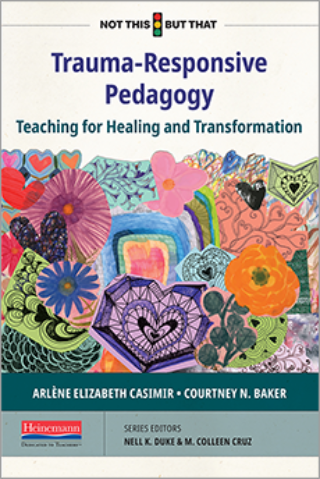
The following is adapted from Trauma-Responsive Pedagogy: Teaching for Healing and Transformation by Arlène Elizabeth Casimir and Courtney N. Baker.
As educators, we want what’s best for our students. And we have a vision for what that looks like. To support our students in more closely connecting with the vision that we cocreate for their learning experience, we make statements and decisions that we believe will help our students. However, our well-intentioned efforts can—and often do—cause harm. While administrators and teachers, for example, ask students to comply with the upbeat ideal to “show some grit” or “be positive!”, we simultaneously punish children for failure to adhere (Love 2019). In doing so, we may unconsciously, or consciously, shame students for their trauma responses and perhaps cause retraumatization.
How We Can Miss the Trauma
Like many teachers, I wanted to have strong classroom management so that I could teach academic content that could help my students decide what kind of people they wanted to be in the world. This meant I wanted students to control themselves. There I was, in a classroom in New Orleans, sitting on a carpet with twenty-eight fourth graders, all of whom were grappling with personal, racial, societal, and/or communal trauma. Oftentimes, their trauma exposure responses interrupted our lessons and took us off course. It’s easy to get very discouraged and frustrated by our students’ pain. But as teachers, we need to recognize that once you can help a child to name the emotions and the trauma response, you can support them to move through it with acceptance, compassion, and grace. With research, practice, and time, I developed an understanding of what I was seeing and began thinking about how to teach into the phenomenon of children expressing their trauma responses in the classroom. I began to notice a gamut of trauma responses and how they manifested for students behaviorally, cognitively, physically, interpersonally, and emotionally (Center for Substance Abuse Treatment 2014).
In past scientific research, scholars believed that there were only two universal responses to stress and trauma: fight or flight (McEwen 2007). Clinicians and practitioners have since discovered additional manifestations of trauma, such as “friend” and “freeze” (Seng et al. 2019). The "9 Fs” of Student Trauma Manifestations is a framework I’ve developed through years of my lived experience and learning alongside children and adults to comprise an application and extension of those ideas and how they might show up in educational settings, as well as how we might misread them.
| POSSIBLE RESPONSE | MANIFESTATIONS | SCHOOL-SPECIFIC SCENARIOS | HOW THEY MIGHT BE MISREAD |
| Fight | Anger Aggression Argumentative Confrontational Explosive | Hitting Overreacting Throwing things Yelling A rebuttal nature | We may misread this behavior as the child being “aggressive,” “bad,” emotionally disturbed, or having oppositional defiant disorder. |
| Flight | Anxiety Panic attacks Paranoia Feeling trapped Escaping without a word A runner | Fidgeting Constantly asking to go to the bathroom or looking for excuses to leave the room Leaving the room without a warning or a word | We may misread this behavior as a child being distracting to other students, off task, unfocused, and presenting a dangerous potential to run away. |
| Freeze | Confusion Dissociation Hiding Numbing Spacing out Procrastination | Appearing shut down or with drawn Physically slow moving Nonresponsive | We may misread this behavior as a child being spaced out, emotionally distanced, cold, and depressed. |
| Faint | Shutting down emotionally, mentally, spiritually, and physically | Passing out Napping Placing head down on table Confusion | We may misread this student as disengaged, ill, tired, and seeking unnecessary attention. |
| Fawn | People-pleasing or being overly accommodating Fears disappointing others by saying no Neglecting personal needs to be accepted by others Perspective taking to a fault Super polite Betrays needs and self | May not go to the bathroom even if they need to go Always offering to help May have a very strong social awareness and be hyperaware of others’ emotions and needs before their own May be behind on their own work and still willing to help others to be accepted | We may misread them as either annoying, a tattletale, or on the other hand as helpful, super sweet, a teacher’s pet. |
| Forget | Loses materials Misremembers next steps for improvement plans Avoids situations that could lead to conflict Lets others make decisions | Never brings their materials Does not remember the intervention that you’ve given May seem disorganized | We may read them as having ADD, ADHD, not wanting to learn, not caring about school, and even as disrespectful for dismissing interventions that we have put into place to help them succeed. |
| Front | Posturing, or putting on a persona of toughness | May come off as stoic and have a poker face Does not see others, especially adults, as trustworthy Does not show an emotional response to emotional stimuli | We may misread them as strong and not in need of compassion, empathy, and tenderness. |
| Fool (note: this is a verb, not a noun) | Laughs at inappropriate times and in inappropriate places Has nervous laughter Laughs to keep from crying | May come off as the class joker Insensitive and even cruel | We may misread them as immature, insensitive, and out of touch. |
| Friend | Trauma bonding, or forming relationships based on similar harmful experiences Engaging with people who repeatedly cause harm Maintaining relationships based on “what’s wrong” Stockholm syndrome | May seem stuck in friendships that are “bad” for them but see no way of getting out Friendships based on constantly discussing and reliving traumatic events Lack of healthy boundaries in social relationships | We may think these friends are “supporting” one another. However, they may be circling in a toxic cycle of trauma, forcing students to constantly repeat it. |
I want to emphasize that this framework is not a checklist or a tool to label children. These responses are verbs, not nouns. My hope is that this figure serves as a resource for educators to identify and learn the manifestations of students’ trauma responses. If, as teachers, we are not able to correctly identify a trauma response, we may react as if the student is behaving that way on purpose. We may turn to restricting privileges, detention or time-outs, and other punishments that don’t address the root cause of the student’s action or support them through their challenges. We may even label the student as a “bad kid” and subconsciously treat them as such. Students are very perceptive and aware of how we feel about their trauma. They know when our classrooms and lesson plans do not have space for them to explore their responses, to integrate them, and to heal. The problem? Although social-emotional learning may seem disconnected from academic content, the two are deeply interconnected. When a student is exhibiting a trauma response, it overwhelms “the ordinary systems of care that give people a sense of control, connection, and meaning” (Herman 1992, 33). In a word, children are unable to absorb and process what we are trying to teach if their brain is busy worrying about their safety.


Arlène Elizabeth Casimir is a Brooklyn-based activist, educator, herbalist, healer, and writer. Her experience teaching middle school and elementary school in New York City and New Orleans awakened her purpose of drawing on culturally-sustaining and trauma-responsive teaching practices to nurture the inner genius and inner teacher in others. She founded, designed, and implemented a healing-centered curriculum for her students post-Hurricane Katrina. As a first generation Haitian American, Arlène recognizes the power of community, equity, literacy, and spiritual resilience to help others live with personal integrity, transcend their circumstances, and author their own lives. She enjoys working with teachers, families, schools, and community organizations to do the inner work for socially just outer change. She is currently studying Clinical Psychology and Education with a concentration in Spirituality Mind Body at Teachers College, Columbia University; and leading her educational consultancy, The Awakened Collaborative, LLC where she works as a staff developer and partner to various institutions that are aligned to her mission, vision, and values as an educator.

Dr. Courtney N. Baker is an Associate Professor in the Department of Psychology at Tulane University. She is a licensed child clinical psychologist, and she directs the APA-Accredited School Psychology Doctoral Program, the Project DIRECT Early Childhood Consultation Service, and the Psychology Clinic for Children and Adolescents. Dr. Baker is a member of the Coalition for Compassionate Schools and the Violence Prevention Institute. She is an implementation scientist and a prevention scientist who studies violence prevention, including trauma-informed approaches, socioemotional learning, and school-based mental health. Dr. Baker’s research, teaching, and professional service aim to promote the well-being of children who are marginalized due to surviving adversity and trauma, living in poverty, or experiencing racism and discrimination. The long-term goal of Dr. Baker’s research is to shrink and prevent disparities in health and academic achievement.


